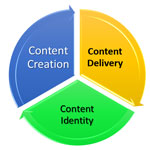As Rachel Lovinger states in her becoming-a-classic article, the content is so pervasive that everyone thinks they know all there is to know about it.
She continues her article with the following suggestion:
Content strategists in the digital age need to become data philosophers and explore the metaphysics of content, starting with the question “What is content?” and “What would make it more meaningful?”
Here’s where I am going to start my story.
Talking about the content in a broad sense is quite difficult. Where there is a container sure there can be a content.
Considering a bowl as a container, the food inside can be considered as content. In the same way, the software can be considered as content if you call the hardware a container. By the way seems every content can be a container itself for another type of content.
The first one who invented the book made a container for words and stories. In a the same time stories themselves became a container for illustrations.
The same story holds true for the digital age. Computer hardware (e.g. ENIAC) can be considered as one of the first containers invented by the electronic industry and their early programs (e.g. Ballistics trajectory calculations) became the first contents of the digital age.
But still the computer hardware could not be called a real container as it was not flexible enough. Still the main part of computations were hardwired inside the machines. May it be more logical if I call electrical and electronic parts as container and wiring as content.
Considering the history of personal computers, the first operating systems (like MS-DOS and Mac OS) can be considered as a real example of content creation for an existing container.
Here the amazing story begins. While most container creators are busy with intense competition to dominate the industry, a content creator emerges as the new king of the kingdom. Success stories of both Microsoft and Apple are mainly attributed to providing a user-friendly content for an already existing hardware container.
Soon IBM and the other old emperors, were forgotten in the happy yells for the newcomers who challenged them as the big brother of the digital age (Sure you have seen Apple’s 1984 Ad).
But this story never ends. Zuckerberg, Hoffman, and Systrom are just a few samples of the next generation of content providers. Social networks are kind of content for the operating systems and digital gadgets as a container.
Seems that the story is going to be continued. Sooner or later, every content provider becomes the owner of a container witnessing rise of the next generation of content providers.
Here’s the point where the new roles and positions emerge:
Content Philosopher who sees the horizons behind and ahead. The one who tries to understand the reason behind the human interest in content and to foresee the ever-changing trends of the content palate in the society.
Content Strategist who analyzes the content, plans for content creation and delivery, gathers expertise in content governance and finally the main decision maker behind content delivery rooms.
Content Marketer who works as the pawn in the great chess of content kings and sure, claiming the power wherever there’s no content strategist beside!
The other positions include Content Creators, Content Auditors, Content Researchers and Content Curators, to name a few.
Soon we will discuss all the terms mentioned above.





